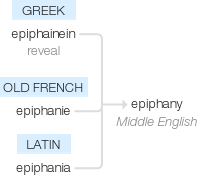Epiphany
Middle English: from Greek epiphainein ‘reveal’. The sense relating to the Christian festival is via Old French epiphanie and ecclesiastical Latin epiphania .
wiktionary
From Middle English epiphanie, from Old French epyphanie, from Late Latin epiphania, from Ancient Greek ἐπιφάνεια(epipháneia, “manifestation, striking appearance”), from ἐπιφαίνω(epiphaínō, “I appear, display”), from ἐπί(epí, “upon”) + φαίνω(phaínō, “I shine, appear”). English Epiphany (of Christ) since the 14th century, generic use since the 17th century.
etymonline
epiphany (n.)
early 14c., "festival of the manifestation of Christ to the gentiles" (celebrated Jan. 6; usually with a capital -E-), from Old French epiphanie, from Late Latin epiphania, neuter plural (taken as feminine singular), from late Greek epiphaneia "manifestation, striking appearance, festival held in commemoration of the appearance of a god at some particular place" (in New Testament, "advent or manifestation of Christ"), from epiphanes "manifest, conspicuous," from epiphainein "to manifest, display, show off; come suddenly into view," from epi "on, to" (see epi-) + phainein "to show" (from PIE root *bha- (1) "to shine"). Of divine beings other than Christ, first recorded 1660s; general literary sense of "any manifestation or revelation" appeared 1840, first in De Quincey.
